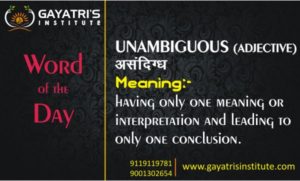Editorial For:- 27-11-2019
Fadnavis falls: BJP overplayed its hand, stands isolated.
SC’s floor test prescription succeeds yet again
In a near replay of its 2018 Karnataka misadventure, the three-day-old Maharashtra BJP government was forced to admit defeat and bow out of office the moment Supreme Court prescribed the test of floor strength. The collateral damage is greater this time. The pre-dawn paperwork that facilitated the secretive swearing in ceremony for Devendra Fadnavis and Ajit Pawar had dragged three important public offices into an unnecessary controversy: that of Maharashtra governor BS Koshyari and with him the Prime Minister’s Office and Rashtrapati Bhavan. BJP will want to reassess the utility of such myopic power grab exercises when numbers clearly are not in its favour.
BJP may have succeeded in Goa and Manipur but the opposition has also upped its game since then. This was evident in the manner in which Congress geared up to meet the BJP’s escalation of stakes during Ahmed Patel’s Rajya Sabha election and the 2018 invitation by Karnataka governor Vajubhai Vala to BS Yediyurappa to form government. The urgency behind the Fadnavis-Pawar installation was the first indication that the newly minted combine did not have the numbers. The Shiv Sena-NCP-Congress “Aghadi” quickly put behind it the setback to mount a strong legal fight, before parading their MLAs on Monday evening for all to see.
Having fallen out with pre-poll partner Shiv Sena and not making headway in wooing Sharad Pawar, BJP turned to his nephew Ajit. But it appears that BJP gambled on the wrong horse, with Ajit failing to loosen his uncle’s grip over the party. Now that Shiv Sena, NCP and Congress are staking claim to form the government with a majority on the floor of the house, other options like assembly dissolution must be off the table for governor Koshyari. Elections are an expensive proposition and can’t be held again and again at such short intervals. Whichever group has the numbers must be allowed to form the government.
The Maharashtra gambit has virtually isolated BJP, evident in the Opposition’s boycotting of the joint session of both Houses of Parliament to mark the 70th anniversary of the Constitution. This was a prestigious moment for the country and the government but the events in Maharashtra have clouded the Constitution Day celebrations. Like in Karnataka, BJP will do better to play the waiting game and be the constructive opposition while watching Sena, NCP and Congress manage their contradictions.
Courtesy: TOI.
Learn Word-Meaning-Antonym-Synonym Of Highlighted words
Editorial For:- 26-11-2019
Hong Kong’s protest vote: On Carrie Lam’s setback
Polls to the district councils allowed protesters to seek a vote for democratic change
The Hong Kong administration led by Carrie Lam suffered a stinging setback on Sunday when voters rejected outright establishment candidates in elections to the city’s 18 district councils. Ms. Lam herself had indicated that the vote would be a proxy referendum on the way she handled months-long street protests, saying that a silent majority backed her administration. The protesters asked voters to express their support for the agitation through the vote to the district councils, the only authority in the city being selected by full universal suffrage. They seem to have listened to the protesters. A record 2.94 million voters turned up, representing 71.2% of the total registered electorate, up from 47% in the 2015 election. The initial results suggest that pro-democracy parties captured 17 of the 18 councils from the establishment parties. In the 452-member district council, pro-democracy parties have won 392 seats, while the strength of the establishment parties, which controlled 292 seats before the polls, was reduced to a historic low — 60 seats. Hong Kong’s city council elections are otherwise a sleepy affair. The councils have limited powers, mainly pertaining to local issues such as waste collection and maintaining public spaces. What drew international attention to this year’s election was the violent street protests. And with their overwhelming mandate to the pro-democracy parties, Hong Kong voters have made it clear where they stand on the issue.
Protests broke out almost six months ago when the city government pushed a legislation that would have allowed the extradition of Hong Kongers to mainland China. Both the government and the protesters have committed a series of mistakes ever since. The government initially refused to withdraw the extradition Bill despite mounting public anger. When the protests snowballed, the administration backed off on the Bill, but it was too little and too late. The protesters now demand Ms. Lam’s resignation, an investigation into the way the police handled the protests, more democracy and electoral reforms. The city government rejected these demands as “wishful thinking” and adopted an increasingly aggressive approach to quell the agitation, which led to pitched battles between the protesters and the police. Both sides used force (the protesters shut down the city’s main airport briefly, occupied a university and used Molotov cocktails and bricks to attack the security personnel, while the police fired hundreds of rounds of rubber bullets and tear gas shells to control the crowd) and the prolonged demonstrations have disrupted city life and pushed its once-thriving economy into recession. The crisis has entered into a stalemate. The question is whether the election results would sway the government to take a more conciliatory approach to resolve the problem. Ms. Lam has said that she would respect the mandate. One way of doing that is offering to talk to the protesters, seeking common ground to end violence and restore order in the city.
Courtesy: THE HINDU.
Learn Word-Meaning-Antonym-Synonym Of Highlighted words
Editorial For:- 23-11-2019
Occupation rewards: On U.S. support to Israeli occupation
Israel’s defiance of international opinion on West Bank settlements is finding U.S. support
The Trump administration’s declaration that the Israeli settlements on the West Bank are not illegal not only challenges international laws and consensus on the issue but also complicates the already-stalled peace process between the Israelis and the Palestinians. To be sure, the decision is in line with President Donald Trump’s Israel policy, which has unconditionally favoured the Jewish nation. In December 2017, Mr. Trump announced that the U.S. would recognise Jerusalem, a disputed city, as Israel’s capital, breaking with an international consensus that the status of Jerusalem should be settled as part of a peace agreement. In March this year, the administration recognised the Golan Heights, which Israel seized from Syria in the 1967 war and has occupied ever since, as part of Israel. And now, with its de facto recognition of the Jewish settlements on the West Bank, Washington has given a shot in the arm to Israel’s religious right, which wants the settlements to be annexed. Before the September election, Prime Minister Benjamin Netanyahu had promised to annex the settlements if voted back. Incidentally, the U.S. decision comes as Israel is inching closer towards another election as neither Mr. Netanyahu nor his rival, Benny Gantz, managed to form a government.
The UN General Assembly, the Security Council and the International Court of Justice have all stated that the Israeli settlements on the West Bank are illegal. According to the Fourth Geneva convention, an occupying power “shall not transfer parts of its civilian population into the territory it occupies”. But Israel has been doing just that for decades. There are at least 4,00,000 Israeli settlers on the West Bank. The ‘security barrier’ Israel has built has cut deeper into the West Bank to incorporate some of the settlements, and the check-points Israel has set up across the West Bank restrict the movement of Palestinians. The Palestinians have made it clear that the two-state solution could be implemented only based on the 1967 border, with East Jerusalem as the capital of a future state of Palestine. Israel is already non-committal on Jerusalem. The right of return of the Palestinian refugees forced from their homes during the 1948 war remains a contentious issue. The third one is the border of a future Palestinian state. Israel has already taken effective control of a huge chunk of the West Bank through the settlements. The UN Security Council has asked Israel to stall the settlement activities, but Israel has hardly paid any attention to international opinion. And now, the Trump administration has rewarded the Jewish state, once again. If Israel goes ahead with annexation of the settlements, the call for which is gaining traction in the country, that will be the last nail in the coffin of the two-state solution.
Courtesy: THE HINDU.
Learn Word-Meaning-Antonym-Synonym Of Highlighted words
Editorial For:- 20-11-2019
Iran on the boil: on nationwide protests
Iran, struggling under the weight of U.S. sanctions, needs to revive the nuclear deal
Nationwide protests that broke out over the weekend are the latest challenge to the Iranian regime that’s already struggling to fix a battered economy, hostile ties with the U.S. and waning influence in West Asia. The trigger was the government’s decision to raise the price of rationed fuel. Thousands of people took to the streets, reminiscent of recent protests in Hong Kong, Chile, Lebanon and neighbouring Iraq. The protesters chanted slogans against the Islamic regime, carried “Death to Khamenei” posters, in a direct challenge to the country’s Supreme Leader Ali Khamenei, and burned down banks and stores. Security personnel reportedly unleashed violence on the protesters, while the government shut down the Internet. According to Iranian media, at least 12 people were killed, including security personnel, and some 1,000 protesters were arrested. Both President Hassan Rouhani and Ayatollah Khamenei, the real ruler of Iran, have condemned the protests, while the Islamic Revolutionary Guard Corps, the country’s top paramilitary force, has threatened to crack down on the demonstrations, raising the prospects of more violence.
Iran still has one of the lowest fuel prices in the world. But the rise was enough for a people reeling under high inflation, joblessness and a collapsing economy to take to the streets. President Donald Trump’s decision last year to pull the U.S. out of the 2015 nuclear deal and reimpose sanctions has dealt a blow to Iran’s economy. Inflation has risen to 40%. A quarter of Iran’s youth are unemployed. And according to the IMF, the country’s economy is expected to contract by 9.5% this year, while the currency, the rial, has plunged to record lows against the dollar. It is now evident that the collapse of the nuclear deal has cost the Iranian economy dearly. And the protests broke out at a time when Iran’s influence in Lebanon and Iraq is being challenged by protesters. In Iraq, protesters burned an Iranian consulate and turned their anger against Iran-trained militias. In Lebanon, where Iran-backed Hezbollah is a key pillar of the government, protesters demand the resignation of the entire political class. And now in Iran, the protesters challenge the regime itself. In recent years, Iran has seen many protests and labour agitations. And the regime’s response has always been typical. It branded the protesters as counter-revolutionaries and blamed foreign hands. The economic woes have weakened the delicate balance between the regime and its angry youth. The latest round of protests might die down. But Iran needs a lasting solution to address its revolting underbelly. It can’t violently suppress the protesters forever and needs to get the nuclear deal back on track.
Courtesy: THE HINDU.
Learn Word-Meaning-Antonym-Synonym Of Highlighted words
Editorial For:- 19-11-2019
Wrong signals: on the release of killers of Melavalavu
The release of killers of Melavalavu sends out an undesirable message to society at large
The release of 13 life convicts responsible for the massacre of six Dalit men in Tamil Nadu in 1997 has caused understandable disquiet among activists and members of the Scheduled Castes. The Madras High Court has voiced its displeasure over the release of the convicts, on grounds of ‘good conduct’ in prison, and asked the State government to produce the relevant orders. The murder of Murugesan, who was elected president of the Melavalavu panchayat in Madurai district, along with five others, by members of a dominant caste, who resented the local body’s leadership being reserved for Scheduled Castes, had created a sensation then. That was an era in which there was considerable communal tension between Dalits and intermediate castes. In the Melavalavu case, the Sessions Court and the High Court had sentenced 17 men to life terms. The Supreme Court confirmed the convictions in 2009. Three convicts in the Melavalavu case were released in 2008 by the DMK regime. Now, the AIADMK government has courted controversy by freeing the remaining 13 (one is no more). Last year, it convinced the Governor to agree to the release of three men found guilty of burning alive three students when they set fire to a bus in Dharmapuri during a protest in 2000. The Supreme Court had initially upheld the death penalty for the three, but, on a review petition, commuted it to life, citing their lack of intention to kill members of the public and that they had been gripped by “mob frenzy”.
The Supreme Court has repeatedly clarified that ‘life sentence’ means imprisonment till the end of one’s natural life. However, the law also provides for remission of sentences, including life terms. Under Section 433A of the Code of Criminal Procedure, a convict sentenced to life for an offence that also attracts the death penalty, or has had his death sentence reduced to life, can be considered for release only after completing 14 years in jail. Last year, the AIADMK government released hundreds of prisoners to mark the centenary of late party founder M.G. Ramachandran. While decongesting prisons by freeing inmates, especially for good conduct, and after they have served specified years, is permissible in law, there will be a question mark over mass release without regard to the nature of the crimes committed. Guidelines for remission do exclude those in prison for specified crimes such as terrorism, rape and economic offences. But when those guilty of a caste atrocity such as the Melavalavu massacre are released, it is certain to send out an undesirable message. Ideally, mass release of prisoners should be avoided, and the desirability of freeing each one of them should be separately considered. The Advisory Board that recommends such release should have the benefit of a social impact report as well as the opinion of the trial court.
Courtesy: THE HINDU.
Learn Word-Meaning-Antonym-Synonym Of Highlighted words
Editorial For:- 15-11-2019
Review and reference: On Sabarimala review pleas
An omnibus reconsideration by the SC of all issues of religious freedom was unnecessary
Ordinarily, a reference to a seven-judge Bench for an authoritative pronouncement on the entire gamut of issues arising from Article 25 and 26 of the Constitution, which protect the religious freedoms of individuals and denominations, would have been welcome. However, the order of a Constitution Bench in making such a reference, while delivering the verdict on petitions seeking review of last year’s judgment allowing women in the 10-50 age group to offer worship at the Sabarimala temple, is problematic. The order, passed by a narrow majority of three judges, with two dissenting, means that the review petition, as well as fresh writ petitions, on the issue will be kept pending until there is clarity on the nature of religious rights. The majority, headed by Chief Justice Ranjan Gogoi, held that the petitions against the 2018 verdict, which laid down that the practice of keeping women of ovulating age out of the shrine is discriminatory and violative of the right to equality, have revived the question whether an individual’s right to worship can outweigh a religious group’s right to manage the affairs of its religion. An issue resolved by a 4:1 majority is sought to be reconsidered by formulating fresh questions on the interplay between religious freedom and other fundamental rights, especially the right to equality.
The majority anticipates that similar basic questions on the conflict between individual freedom and constitutionally-protected religious beliefs may arise in other situations too. It cites pending petitions concerning the entry of women into a dargah, the entry of Parsi women married to non-Parsis into an agyari, and the practice of female genital mutilation among Dawoodi Bohras. It is shocking that the Bench includes the abhorrent practice of female genital mutilation in this genre. It is well-established that freedom of religion, under Article 25, is subject to public order, morality and health, and it may not be difficult for any court to test the validity of the practice against the restriction on grounds of a woman’s health, and this may not require an exalted panel of seven judges. In keeping the petitions on Sabarimala pending further, the court has displayed a disquieting inability to stand by its previous transformative judgment. Further, it may lead to a repeat of the unsavoury incidents of last year when religious groups and political activists blocked and attacked women devotees. Justices Fali Nariman and D.Y. Chandrachud, in their dissent, rightly call out such transgressions against the rule of law and, while rejecting the need for review, want all authorities to remember their constitutional duty to work in aid of the Supreme Court and the law laid down by it. An omnibus reconsideration of all issues related to religious freedom was not the way out of the serious issues posed by the Sabarimala judgment.
Courtesy: THE HINDU.
Learn Word-Meaning-Antonym-Synonym Of Highlighted words





